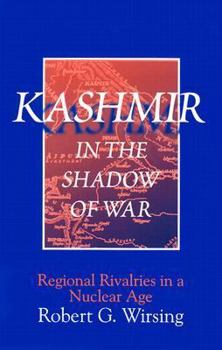Kashmir in the Shadow of War: Regional Rivalries in a Nuclear Age
This timely study examines the Indian-Pakistani conflict over Kashmir as this long-standing confrontation between regional rivals became inflamed. It focuses on the period from the effective... This description may be from another edition of this product.
Format:Paperback
Language:English
ISBN:0765610906
ISBN13:9780765610904
Release Date:February 2003
Publisher:Routledge
Length:296 Pages
Weight:0.92 lbs.
Dimensions:0.7" x 6.0" x 9.1"
Customer Reviews
1 rating
Kashmir's Endless Conflict
Published by Thriftbooks.com User , 19 years ago
Robert Wirsing's latest book on the Kashmir conflict explores sensitive issues such as whether Pakistan is a frontline ally in America's war on terrorism or whether it is the linchpin of the axis of an Islamic Jihad. His book makes unsettling reading for those who like to think the war against "The Axis of Evil" is over and won. Although Saddam Hussein and the Taliban might both be spent forces, there are bigger and more dangerous forces now coming into focus. Chief among those are Pakistan, India and the People's Republic of China. All three of these are nuclear powers and all three are involved with the United States and other regional Asian powers in a delicate balance of power play. Although the Korean peninsula and Taiwan are the most immediate strategic places of consequence for Japan, because Kashmir, Wirsing's area of expertise, has been a major flashpoint since 1949, Japan, like the world at large, ignores it at its peril. The difference between past conflicts over Kashmir and any future one is that both India and Pakistan now have the capacity to give us a fully fledged nuclear war and China, which always keeps a weather eye on India, might join in as well. The result, needless to say, would be apocalyptic. The low intensity alternative - whereby units of Pakistani Intelligence fund and run Islamic terror groups - which Wirsing also explores at some length, does not seem any better. Although India is a fractious country, it seems to be infinitely more stable than Pakistan, which tends to have too many military officers who, when they are not engineering coups, believe in robust responses on issues like Kashmir. These same generals promoted the Taliban takeover of neighboring Afghanistan and now that their Afghan allies are gone into the garbage can of history, Wirsing explains that they have to face the prospect of India gaining the upper hand diplomatically and economically in Afghanistan and all of Central Asia. Kashmir, he explains, is the joker in their deck of cards; it allows them to keep India wrong footed and on the defensive. Given that India has an overwhelming military capability and that Pakistan's only trump card is a nuclear first strike, the stakes are obviously sky high. The author points out that the defeat of their Taliban allies has caused Kashmir insurgents dearly. The Pakistani generals have been forced to back peddle not only on Afghanistan but on Kashmir as well. As a string of arrests of Islamic militants show, Pakistan has, however belatedly, joined America's crusade against the Taliban and Al Qaeda, their former allies. However, Pakistan's renunciation of terror groups makes it politically difficult for them to continue to support armed insurrection in Kashmir. Wirsing points out that, as long as the two belligerents can confine hostilities to Kashmir, the rest of the world would prefer to ignore the problem. However, he also points out that the United States' war on terrorism means that the problem will






